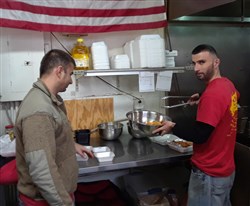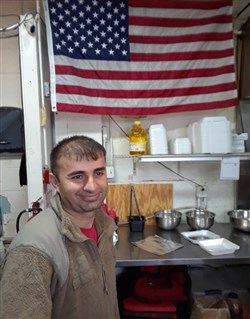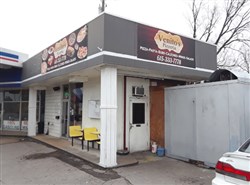VOL. 43 | NO. 4 | Friday, January 25, 2019
From hell to kitchen: Kurds cranking out tasty pies

Idris Dosky and Don Dosky work together to get a meal ready for delivery at Venito’s Pizza.
-- Tim Ghianni |The LedgerThe American dream, the stuff that keeps our country great, thrives on the edge of an industrial cliff overlooking Radnor Yard, in a tidy space where a band of brothers – literally – daily provide pizza from recipes learned in the years since they became accustomed to witnessing death, even their mother’s, while escaping Saddam Hussein.
Before I get into their story too deeply, I’ve gotta add it’s damn good pizza this tight-knit Kurdish crew builds in the graffiti-lined confines of the small attachment to Ben Little’s Pure gas station. I’m mentioning the Pure station not only because I know and like Ben – who the pizza-making Dosky family calls “a really great landlord” – but as a landmark in case you get lost while seeking great Kurdish pizza, calzones, wings, salads, pasta and more.
“We’ll see people driving out there (on Trousdale), going back and forth looking for us when they are coming to pick up their order,” says Don Dosky, 26, one of the brothers, as he leans on the front counter and watches cars roar past. “We know they are looking for us, so we’ll call them” using the phone numbers on their order tickets.
He laughs. The place is almost invisible, but if it is found – or if you are fortunate enough to discover it – it won’t be your only visit.
The Doskys’ pizza place at 4663 Trousdale Drive is a monument to realizing the promise of the promised land by following the shining light, the beacon for refugees ever since Plymouth.
The fact the Doskys arrived at this man-made clifftop over the rail yard is a blood-spattered miracle. Their trail includes fleeing bombings, witnessing refugee deaths and even seeing their mother, Shakira, die of burns that covered her body after a propane tank exploded in their tent in a refugee camp in Turkey.
“It was a twister of flame,” says Idris Dosky, 32, using his right arm to fashion a spinning tornado, illustrating the fiery explosion that took his mom, who had put herself in the path of the propane blast by returning to the tent to save her children
“It was the most horrific thing that could ever happen,” he says. He offers up a few details about the burns, blisters and the pain his mother endured for the next two months while her family did its best to comfort her as she died.
He grows silent, eyes playing across the yellow ticket on which he’s just recorded a call-in order for pizza and cheese sticks.
“People who try us really like us,” he says, adding that they do a lot of business in their own neighborhood at the edge of Harding Place. “We also do a lot over at Vanderbilt Medical over at 100 Oaks, a couple miles away. They like us.”
The previous order requires the efforts of both the brothers on this shift. (Other brothers and “close family,” i.e. cousins and Kurdish friends, come here at other times to keep up with the demand for dough, sauce and whatever is ordered during every hard day’s night at Venito’s, which is open 10 a.m.-9 p.m. Monday-Thursday, 10 a.m.-11 p.m. Friday and noon-11 p.m. Saturday.)
Tearing the order ticket off the pad, Idris turns to Don and the two, wordlessly, divide the duties, teaming when needed in almost-choreographed movement, a sort of Kurdish pizza ballet through the long, narrow kitchen. They assemble the order of deep-fried mushrooms, cheese sticks, chicken wings and pizza.
“A lot of people think we’re Italian, because our food is so authentic,” Don explains as he watches his big brother slip out the side door from the kitchen – “I’ll be back in 10 minutes” – to make a free delivery from this family business that is just around the corner, literally, from the family home in the Caldwell Abbay Hall neighborhood.
This All-American, middle-class neighborhood of ranch houses and two-story homes is a fitting refuge where father Adil and the 10-member troupe finally discovered peace after escaping Saddam’s nerve gas and bombs, the poisoned food offered by Turks at the refugee camp – “They hate us,” Idris describes the relationship between Turks and Kurds – and even the frozen loneliness of Fargo, North Dakota.
“You like a slice?” asks Don, simultaneously placing two savory wedges on the counter in front of me as I fill almost half of the compact area where customers stop to make orders or retrieve pick-ups. There’s no dining-in here, no room … although hearty souls can try the plastic chairs and tables out front. Don goes behind one of the graffiti-covered walls and returns with the necks of four cold drinks wedged between his knuckles. “Take what you want,” he says.
His bright smile mirrors my own after I bite into the first slice. “We took a little bit of New York, a little bit of Chicago, a little bit of West Coast-L.A. and a bit of Kurdish to make our recipe,” he offers.
Idris returns from his 10-minute delivery and launches into getting more wings and mushrooms prepared for their deep-fry bath.
Larry Ruiz brings cheer and testimonial in from the winter-gray day. He works delivery at Harlan Electric in the industrial park on Allied Drive, blocks away; and to say he is a frequent customer is understatement.
“This is the best pizza I’ve ever tasted,” he says, as the two brothers box and bag his order, fresh from the pizza oven and the deep-fryer.
“I come here because they are friendly, too,” Larry points out. “That’s it. Their pizza’s good, and so is their friendship.”
Others who come in here to order or to wait for a pick-up spend their time covering the entryway walls with graffiti, much of it praising the world’s best pizza, the most excellent stuff to ever come out of Kurdistan … or simply to leave their names and caricatures.
Don explains that this is at least encouraged for now, “because look how ugly the walls are.”
Four years ago, when the brothers took over from the previous owner of Venito’s – where Don and Zeyo, now 28, already were cooks – they were faced with the problem of the tall, ugly drywall partitions in this little opening where customers wait.
“We thought about painting it, but we’d have had to close for two days for the paint to dry,” Don says. Time is money, so Idris invited customers to express themselves on the walls. A more recent development is the rows of $2 bills that Don has begun rescuing from the cash register and stapling to that drywall.
“Two-dollar bills really look nice,” he points out, retrieving a few more from his stash. “Get three more and I’ll have enough to start another row.”
“Funny, cool, nice,” is how he describes the cash-and-graffiti design scheme.

America already is pretty great for Idris Dosky and his pizza-making family, which long ago escaped from terror to eventually fashion success on Trousdale Drive. The main decoration in their Venito’s pizza is Old Glory, the flag of their chosen nation.
-- Tim Ghianni |The LedgerDon says he and Zeyo, longtime cooks here, helped turn this into a Dosky business because their boss, family friend Merdon Abraham, also a Kurdish refugee, wanted to sell the pizzeria and try other ventures.
The brothers note that Merdon now dabbles in real estate. “I think he just started a Gyro in Chattanooga or Knoxville,” Idris says. “I think Knoxville.”
The brothers admit it took awhile after buying the place to master their recipes, but they credit their stepmother Shirin for their education.
“She makes food at home,” Don says. The boys watched and tried to learn. “We just needed a little bit of help.
“The thing about Kurdish moms is they don’t use no measurements. It’s ‘just a little bit of this, a little bit of that ….’”
The boys deciphered the “this-and-that” formula and began serving it and continue improving on it as they go along.
By the way, the name of the place, “Venito’s,” came from previous owner Merdon. “He was just trying to make it sound Italian,” says Don, explaining that the name was lifted from the Italian region of Veneto, which has Venice as its capital.
“I did some research,” Don recalls. “He misspelled ‘Veneto.’” Makes no difference, as customers are here for pizza, not gondola rides.
However you spell it, the pizzeria on the edge of an industrial cliff overlooking Nashville’s sprawling rail yard is a safe haven and source for comfort food, not just for customers but for the young men who fled Saddam, the murderous thug of a dictator whose blood-thirsty ways included killing the Kurdish with nerve gas and so-called “conventional bombs.”
“We lived in Dohuk, in Northern Iraq, Kurdistan,” Idris says. “There were 10 of us.”
One night in 1990, the family was eating dinner in their home in Dohuk when bombs began to fall. “It was about 8 p.m., and the airplanes and stuff began dropping bombs while we were eating,” Idris remembers.
“We saw a white flash. My father, who had been in the military, knew what it was, so he yelled ‘DUCK!’ and then it was ‘Dud-Doooo,” says Idris, adding sound-effects to his recollection of those blasts.
The white flashes followed by the explosions “had the ground shaking, the house shaking, windows breaking.”
The next morning at about 4 a.m., the bombing started again. “My Dad told us to get what we could, and Mom made some breads, and we left at 5 a.m.”
Never to return to Dohuk, the family joined the stream of Kurds fleeing to Turkey and U.N.-overseen refuge in a country where they were not wanted.
“It took us 3½ months to walk,” Idris recalls. “We walked up the mountains. It was snowing. It was very tough. When we were walking, we’d look up and see people fall from the mountains. Slip from the mountains.
“You see men, women and children falling and dying, and there’s nothing you can do about it. You see so much death.”
Difficult enough for an adult to witness. Idris was kindergarten age. Others in the family who were younger probably don’t have such vivid memories.

The tiny pizzeria as seen from the side, where the door from the kitchen is used for delivery workers – brothers and cousins – to exit to the parking lot. The main entry door is to the left of the outdoor seating.
-- Tim Ghianni |The Ledger“We used potato sacks for sleeping bags. It sucks, because it would rain and snow, and the sack would get wet, and we’d get sick. It was ‘The Walk of Tears,’” Idris says.
Eventually they did make it to the refugee camp in Silopi, Turkey. Idris says the Kurds were poisoned or otherwise abused by the host country when the U.N. wasn’t looking.
“It got to be normal seeing people die,” he admits. “It was like ‘So-and-so died,’ and it was like ‘So what?’
“Finally, in 1993, we got a family to sponsor us in Fargo, North Dakota…. We had all seen pictures of America, with all the nice scenery and the people wearing shorts,” Idris continues.
“In Fargo, we wondered where all those people were. It was very cold. But at least we were safe,” he says. “But I wasn’t too fond of Fargo.”
Grateful for being saved, the Kurdish refugees simply didn’t like their situation in the city perhaps best-known for Steve Buscemi being chewed up in a wood-chipper in the great Coen Brothers’ film “Fargo.”
Because they knew many other refugees in Nashville, because Music City is warmer and “there were more job opportunities for us here than in Fargo,” the family moved here in July 1994.
In Nashville, they have taken advantage of the many opportunities, educationally and professionally. For example, Idris was, for a time, a student teacher at Overton High School and then gym coach at Bass Middle School. He’d like to take that educational experience back with him to Iraq and work with young people there. He’s already gone back to his homeland in the past to work as an interpreter for the U.S. Army.
Older brother, Abid, 40, who is not involved in the pizza establishment, has been working as a mechanic at Nissan for 20 years, Idris says.
Hassan, 39, who works in the secure-document-shredding field at Richards & Richards, also is not involved in pizza. But he teams up with Abid to keep close watch on Idris and the others at Venito’s.
“They overshadow us,” Idris says. “Keep us in control. We’re brothers, so if we have problems between us, they’ll straighten us up.
“Our father, Adil, is the chief, so if they need to talk about us and our problems, they’ll pick up the phone and call him.”
Unfortunately, Adil, 70, is in failing health. “He’s in and out of the hospital about every other week,” Idris says. “Age, mostly.” His life’s journey would not, obviously, turn him forever young. To the contrary, of course. But Adil still loves to help his family.
“During our growing-up period, our Dad liked to cook,” Don adds. “We’re good at hands-on things, so that’s why we do decent business here.”
After their treacherous journey to get to safety atop the cliff overlooking the rail yard, the brothers are debating expansion.
“We’d like to open another restaurant. Maybe downtown or in Cool Springs or Murfreesboro,” Don says. “If you know you can do it, you need to go where the competition is.”
Idris isn’t so sure. But they don’t argue about it. Maybe their big brothers will sort it out. Or “the chief.”
“If you are doing something you are good at, and you are fond of doing, it’s 10 times better than a 9-5 job,” Don says.
Idris picks up the phone and answers: “Welcome to Venito’s. May I help you?”
After taking down the order and handing it to a cousin, Idris explains that he and his pizzeria brothers don’t forget they have escaped life’s cruelest times, so they try to help others less fortunate.
“We’ve got a lot of homeless who come in and ask for food,” he says. “We give it to them. We tell them ‘just don’t be making it a habit.’ But we don’t turn them down.”
He smiles when talking about these hungry people, and it’s clear he finds joy, spiritual peace even, in giving them pizza or cheese sticks or whatever.
“We had one who came in, and all he wanted was fries,” he continues, noting the homeless do not take advantage of the brothers’ generosity.
“We do it because in our culture we have to do more good deeds. Do a good deed, and since our mother has died, it gives her more peace out there,” he says. “It’s our way of praying.”
Old Glory hangs proudly over the kitchen in the Kurdish pizzeria that is a refuge of hope for these kind brothers and their family, citizens of the land of the free and the home of the brave, the kind of people who have always made America great.